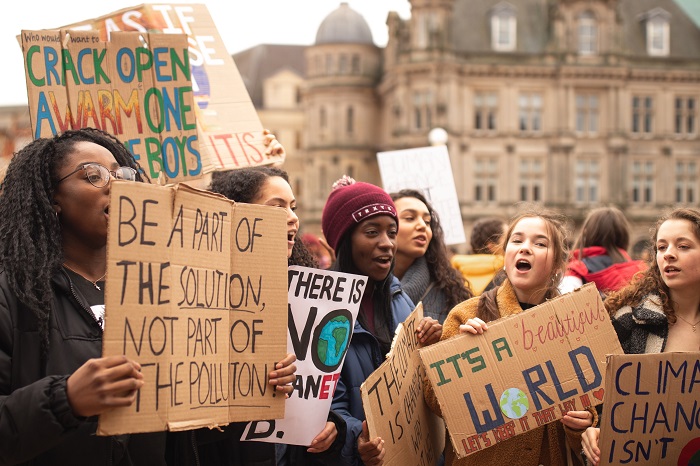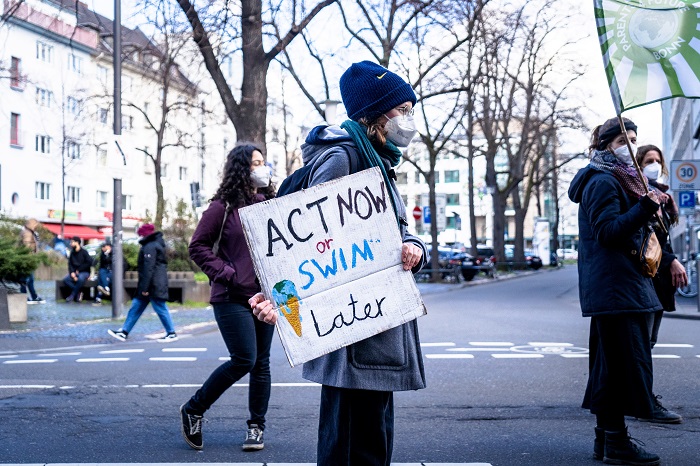Unless someone invents some magic political fairy dust, according to the world’s most trusted scientists we are facing in all likelihood an estimated global average surface temperature warming of 2.4 degrees by the end of the century (Climate Action Tracker). This is an average – it will be 2–3 times this in the polar and higher latitude regions.
This is a terrifying and catastrophic prospect. While some hope for a political breakthrough, others fear it’s too late.
Climate anxiety
Millions of people are reporting a new kind of climate-related mental health crisis. Known as “climate anxiety” or “eco-anxiety”, the medical journal The Lancet has defined it as “anxiety related to the global climate crisis and the threat of environmental disaster”. Its symptoms include depression, insomnia, hopelessness and panic attacks.
Climate anxiety has received prominent coverage in major news outlets like the BBC, Guardian, CNN and Time Magazine, and evidence suggests it is widespread. A poll last year by the American Psychiatric Association found that 67% of Americans surveyed were “somewhat or extremely anxious” about the impact of climate change. It is often reported in the young. In September, a survey of 10,000 16- to 25-year-olds across the globe found that around 75% believe “the future is frightening”, with many hesitant to have children. Place2Be, a charity offering counselling in UK schools, recently warned that young people were feeling increasingly “hopeless and paralysed” by climate change.

The impacts of climate change are not just environmental then, but psychological too.
From Doom to Doing Something
Climate anxiety speaks to the power of hope and fear in confronting shared existential risks. The sheer scale of the challenge, and a sense of frustration and betrayal at continued government inaction, can condition a sense of helplessness and fatalism. As one respondent said: “I had many occasions where I would hide myself away and think, None of this is enough”.

This chimes with a certain strand of pessimistic ecological thinking, associated with figures like Jem Bendell, which argues that “climate-induced societal collapse is now inevitable in the near term”. Modern politics and economies are too invested in propping up fossil fuels. It is too late to avert disaster; better then to prepare and adapt.
For others like Greta Thunberg, that same fear marks the start of a journey of politicisation to do something about it:
We saw these horrifying pictures of plastic in the oceans and floodings and so on, and everyone was very moved by that. But then it just seemed like everyone went back to normal … And I couldn’t go back to normal because those pictures were stuck in my head. … When everyone else seems to just compromise … I want to walk the talk, and to practice as I preach.
Both responses are haunted by images of doom. But whereas the first gives up on the possibility of political struggle, the second insists that it is only through collective political action now that the most disastrous scenarios can be averted.
Courageous hope
Pessimists might say that such hope is wishful thinking. But, in the cases of Greta Thunberg and the School Climate strikers around the world, what we see is a form of hope founded on courage and vulnerability. The ancient Greek philosopher Aristotle called this kind of hope elpis. In the face of danger and fear, such a hope acts courageously knowing that this is the only way to realise an otherwise unobtainable goal. It is a hoping-well, not a breezy complacent optimism.
And the evidence points in Thunberg’s favour. In the last couple of years, countries like the US and China have made previously unimaginable pledges to achieve net-zero emissions by 2050-60, while, around the world, climate change has become an issue most citizens agree requires urgent action. Every day, the technological means and political consensus grows to make our societies more sustainable. What is needed now is collective, courageous action to drive things much further.
What we can do
It’s clear what must be done to achieve COP26’s lofty goals: stop extracting and burning fossil fuels right now, protect and restore forests and natural habitats, and give developing countries substantial financial support to go green. Sometimes this is called coal, cars, cash and trees. Each one of us can play a part individually through lifestyle changes. But it will take more than that. Collectively, we can make our actions matter by pressing our politicians, employers and businesses to do everything they can to support net-zero sustainability too.
Because what is fear or anxiety about, in the end? Dangerous scenarios that may come to pass, depending on whether we act or not today. And when it comes to climate change, to postpone acting until tomorrow is a luxury none of us can afford.
 Click on the banner to explore the COP26 hub
Click on the banner to explore the COP26 hub






Rate and Review
Rate this article
Review this article
Log into OpenLearn to leave reviews and join in the conversation.
Article reviews